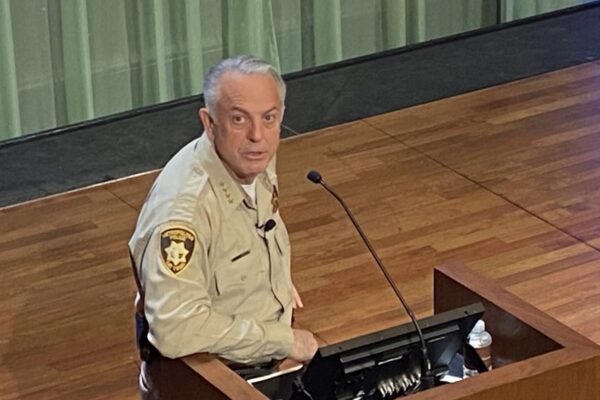LAS VEGAS – The American Civil Liberties Union of Nevada is urging legislators to reject the Governor’s proposed crime bill and take up measures aimed at protecting due process and constitutional rights.
The nonpartisan civil rights organization also joined numerous advocacy and community groups to condemn the Nevada Assembly’s last-minute decision to not permit phone testimony during the Special Session as a “non-transparent and unprofessional” approach to governance that silences the voices of Nevadans on critical issues.
Phone testimony has been used, and even encouraged, by legislative leadership during the last several cycles. With key bill hearings likely to be heard in the Nevada Assembly as soon as 2:00 p.m. today, cutting off phone testimony without notice deprives many of their ability to voice their concerns, particularly with intentional efforts to expedite votes on controversial bills including the Governor’s proposed crime bill and a film tax credit bill that has been mired in controversy over its cost to the state.
The ACLU of Nevada also urged lawmakers, especially Democratic Assemblymembers, to reject the Governor’s proposed crime bill, which would allow for the creation of a Resort Corridor Court and associated “Order Out Provisions,” which the organization says largely allows big resort corporations to judge-shop and will further increase exorbitant costs for a prison budget already in peril.
The organization questioned why Legislative Democrats, who ran on campaigns of protecting due process and the Constitution, refuse to include provisions to the Governor’s crime bill that would require local law enforcement to investigate reports of masked individuals detaining people on the street as kidnappings and to preclude expansion of detention centers without legislative approval, two provisions the organization argues are germane to the bill. While the Governor controls the special session agenda, the ACLU argues Legislative Democrats control the bills within that agenda without question and should show some level of fight to the communities it continues to seek votes from.
ACLU of Nevada executive director Athar Haseebullah said:
“Legislative leadership’s decision to block phone testimony today is an outrageous barrier to public participation that does little to encourage public confidence. With only hours of notice, they’ve cut off rural residents, disabled Nevadans, working families, and anyone who can’t drop everything to appear in person. Suggesting there are legitimate opportunities to be heard as the body crams through controversial bills without true public input is not in line with the historical position of Democrats, who purported to champion inclusivity and accessibility. Blocking phone testimony in a rushed special session on controversial bills is the kind of move you make when you don’t want to hear from the people who will be harmed by it. Regardless of people’s positions on the bills, the people should be heard.
"While there are real emergencies our communities are facing, we are in an unnecessary special session to consider a crime bill that has never met any standard of urgency and is merely a campaign tool for the Governor. If Democratic legislators once again consider advancing the Governor’s crime bill as they did this past May, while again getting nothing in return for impacted communities, including immigrant communities, as ICE wreaks havoc statewide, it will be a sad reminder that the politicians who campaign to communities on messages of “fighting for ordinary people” just don’t have much fight in them. Democratic legislators should, at a minimum, publicly consider our amendments offering protections for our community members in the midst of ICE impersonations and conversations about massive detention center expansions statewide, as our proposals are germane to this bill. Lacking the courage to even debate those proposals wouldn’t just show a lack of values but would show a lack of courage as well.”
Related Content

Firewall for Freedom

Nevada Civil Rights and Advocacy Groups Decry Assembly Decision to Preclude Telephonic Testimony During Special Session
Stay Informed
Sign up to be the first to hear about how to take action.
By completing this form, I agree to receive occasional emails per the terms of the ACLU’s privacy statement.
By completing this form, I agree to receive occasional emails per the terms of the ACLU’s privacy statement.



